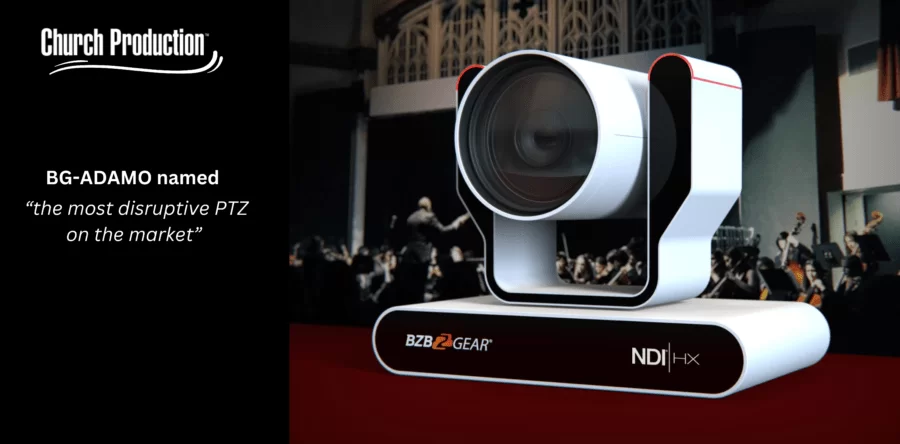[Church Production] Review: BZBGEAR BG-ADAMO-4KND Live Streaming PTZ Camera with Tally Lights

It has been called “the most disruptive PTZ on the market,” which is no surprise considering the awards it took this past year.
BY MARK HANNA | 12.07.22
In the A/V world, some companies have been around forever and are just known quantities. Lately, there have been a bunch of new companies coming onto the scene, which is just fantastic for A/V people everywhere because the new companies push to make sure the established companies can’t sit on their laurels.

One of the newcomers to the industry is BZBGear, and they are making some noise at the trade shows with their new BG-Adamo-4K. It has been called “the most disruptive PTZ on the market,” which is no surprise considering the awards it took: Product of the Year - NAB Show 2022 (largest broadcasting trade show in the US) and Best of Show - IBC 2022 (largest broadcasting trade show in Europe).
Choices Choices
The options available on this camera are pretty intense. First, it comes in a few different models that change the output options. You have the Adamo-4K base model, Adamo-4KND which adds NDI, and the Adamo-4KDA which adds Dante AV-H. All models are equipped with HDMI, 12G-SDI, and LAN port which supports resolutions up to 4K@60. They also have USB 2.0 and 3.0 outputs for use in conference environments. In addition, microSDXC allows you to record 1TB worth of video to store locally. And to top it off, the tally lights are quite effective in aiding the talent in looking at the correct camera during live streams.
...the auto-tracking in the Adamo is better than anything I have seen.
The review unit was an Adamo-4KND with a 12x zoom lens, so we will focus on that model.
The second option is the choice of color; it comes in black or white, and while this may seem trivial, the people who care about this option really care. The third choice is in the lensing; the Adamo-4KND has the option of a 12x optical zoom lens with an 80.4° wide angle, a 25x optical zoom lens with a 59.2° wide angle, or a 31x optical zoom lens with a 59° wide angle. All are equipped with a Sony CMOS sensor: 1/2.5 inch for the 12x and 1/1.8 inch for the 25x and 31x.
The next option is the video output. The Adamo has all the standard video connections, HDMI, and 12G-SDI; beyond that, it has both USB 2.0 and 3.0, direct IP streaming, and NDI. Beyond the connectors, the Adamo also has all the standard video formats, from 4K@60 down to 240p@30 and everything in between. Some formats are only available on certain connections, but that compatibility list exceeds my maximum word count; more details can be found at bzbgear.com. If those options aren’t enough, there is also a micro SD card slot.
The yoke-style mount would seem more stable than the conventional style.
The last big option is control; the Adamo can be controlled via remote, via a web UI, via serial protocol VISCA / Pelco-D / Pelco-P, via control interface RS232/RS422/RS485, or set to auto-track and not be controlled at all. Some people will say that the last one isn’t a valid option; however, on the Adamo, it absolutely is. Also available is the control app BG-PTZ-Control—a free BZBGear proprietary PTZ control software for Windows, Mac, and iOS.

Things to Like
The form factor of the Adamo is exciting; the lens is cradled in a yoke-style control arm rather than the more traditional single side. The yoke-style mount would seem more stable than the conventional style. The top of the yoke also contains really great tally lights; they are evident and viewable from all angles without being obnoxious. They don’t demand your attention, but if you are looking for the tally, it’s no struggle to find it.
Regarding web UI controls, the Adamo might be one of the best available. One of the particularly interesting features was the fact that pan-tilt speed was dampened for the zoom range. With many PTZs, the controls are basically not smart enough to be aware of each other, so panning and tilting a camera, it moves at the same speed if the focal plane is wide or tele. So at full wide, the fast camera will move pretty quick, but at full tele, the same speed is exponentially faster. With many PTZs, the controls get harder to use as the cameras get more zoomed in. Not so with the Adamo; it dampens the movement based on the focal distance, so panning at full tele is just as easy as panning at full wide. This makes the camera entirely useable for following rather than just positioning.
Lastly, auto-tracking. Camera operators worldwide rejoice, for we are not out of a job yet. However, you might want to start strengthening your secondary skills because the auto-tracking in the Adamo is better than anything I have seen. It is, in fact, better than what I have seen some churches stream. It is not perfect, but it follows smoothly; it handles moving closer and farther from the camera well.
In my test, the only issue it struggled with was headroom, it tended to keep the subject’s face more centered in the frame, so there was a bit too much headroom, but aside from that, it was great. Now, BZBGear has recently released new firmware to address this headroom issue. Unfortunately, I was not able to update the firmware during my review.
I would install the Adamo in a meeting room or education institution with zero hesitation, and with this feature set it likely offers an improvement for many church broadcasts. I couldn’t test the camera at standard church camera position distances, typically over 30 feet, and the 12x just isn’t enough lens to be 60 feet away from the subject. Still, in a classroom 15 to 20 feet away, the auto-tracking was basically spot on aside from the headroom. I was shocked at how good it was.
The opportunities
I only found two real faults with the camera, both pretty minor. The first was the noise; the camera does produce a tiny sound from the internal fan. It’s not super loud, but if you sit under it, you will notice it. Secondly, the sensor on the camera seemed dark right out of the box. But with the many parameter settings available, I was able to gain it significantly to get the image bright enough for my liking. The noise reduction worked really well, but I don’t know how well the cameras would handle a very dark environment.
It’s pretty easy to see why the Adamo won so many awards this year; it’s a good PTZ camera, especially one with a starting MSRP of $2699. Honestly, I have been impressed with BZBGear. I think they are bringing a lot to the market, not just in PTZs, though they have several great offerings in the vertical. The company offers a good variety of AV solutions that are worth taking a look at. Don’t sleep on BZBGear.
Mark Hanna
With 20 years technical ministry experience, Mark Hanna now operates FxN Productions, a company focusing on creative services, training and consulting for corporations and churches. You can follow his blog at www.fxnproductions.com.
Original Article:
8.00 a.m. - 5.00 p.m. (PST)
10.00 a.m. - 3.00 p.m. (PST)
(by appointment only)





